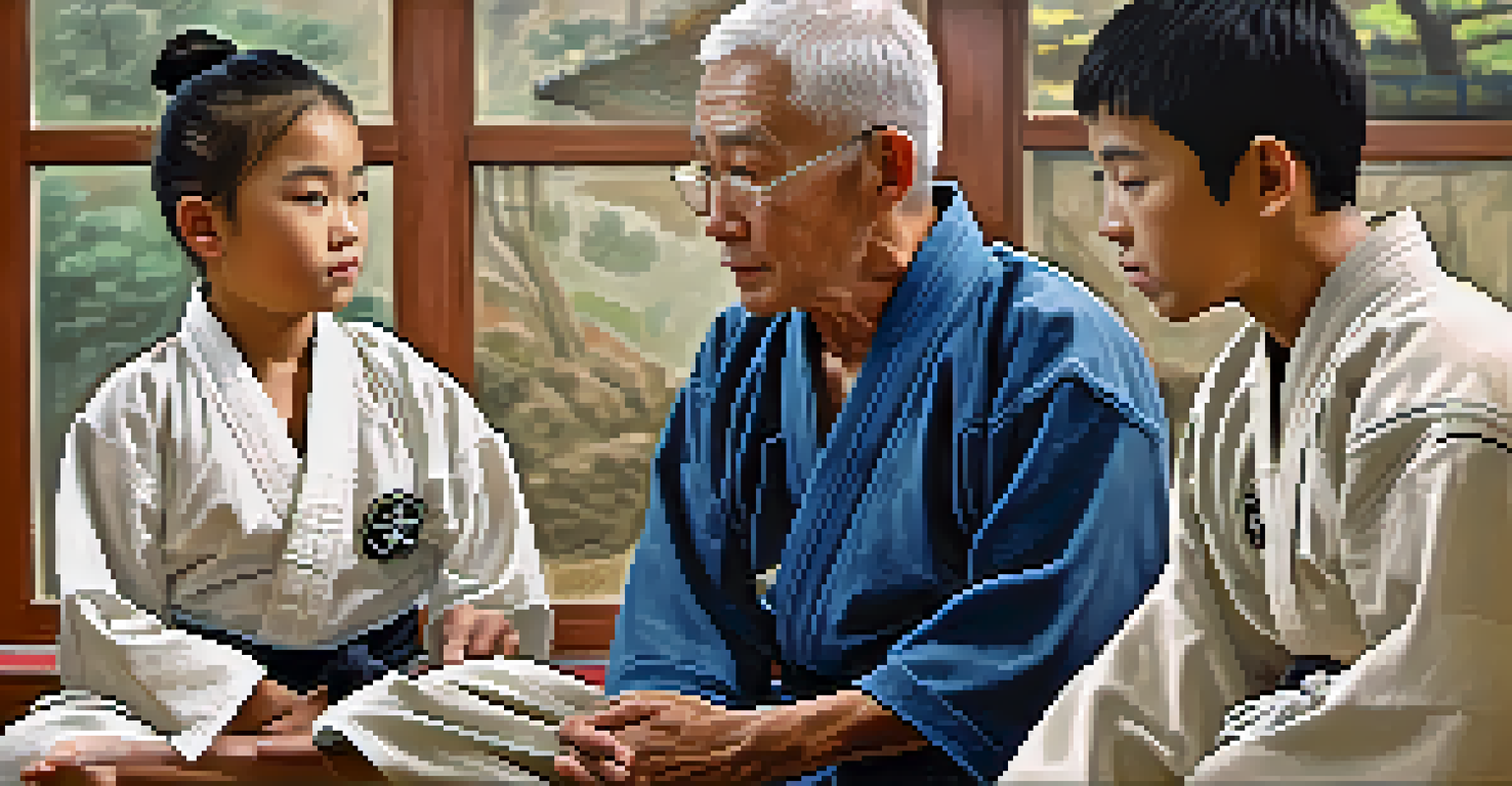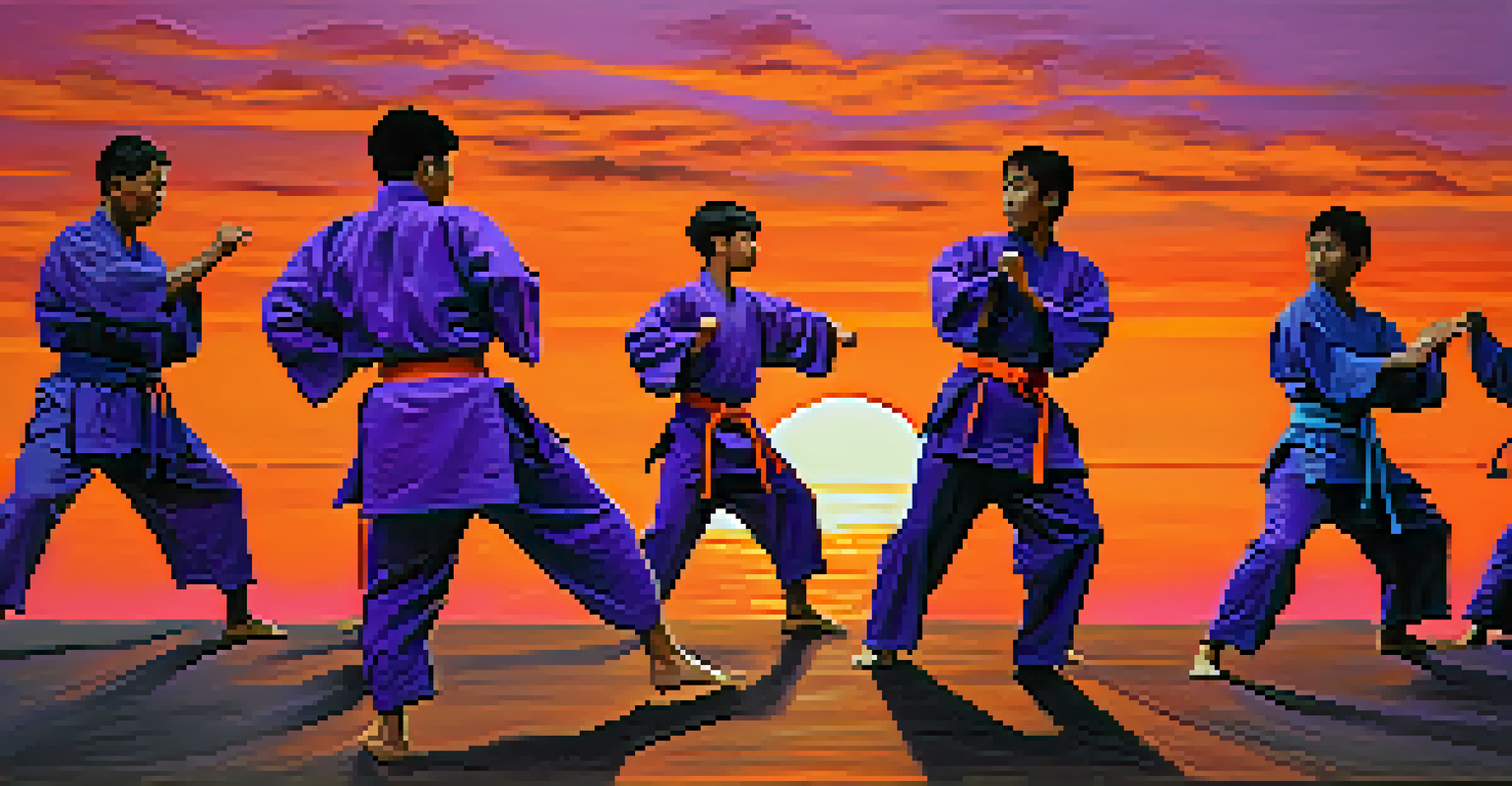Ethical Leadership in Martial Arts: Role Models and Mentorship

Understanding Ethical Leadership in Martial Arts
Ethical leadership in martial arts is about guiding students not just in combat skills but also in moral integrity. It emphasizes values such as respect, humility, and responsibility, which are essential both on and off the mat. By embodying these principles, leaders set a standard for their students, creating a culture that transcends the dojo.
The function of leadership is to produce more leaders, not more followers.
This leadership approach fosters an environment where practitioners feel safe and encouraged to express themselves. It invites discussions about ethics and decision-making, reinforcing the idea that martial arts is more than a sport; it's a way of life. Leaders who model ethical behavior help students navigate challenges, both in training and in their daily lives.
Ultimately, ethical leadership nurtures a deeper connection between instructors and students. It reminds everyone involved that martial arts is not just about physical strength but also about building character. This alignment of values is what cultivates strong leaders and responsible martial artists.
The Importance of Role Models in Martial Arts
Role models play a crucial role in shaping the values and behaviors of martial arts students. When instructors exemplify ethical conduct, they inspire their students to reflect those values in their own lives. This dynamic creates a ripple effect, where one positive example influences a whole community.

Moreover, having role models can provide students with a tangible sense of what ethical leadership looks like in practice. For instance, a sensei who demonstrates perseverance and respect during training sessions teaches students to carry these traits beyond the dojo. Such examples are invaluable in helping students navigate their personal and professional lives.
Ethical Leadership Shapes Character
Guiding students in martial arts involves instilling values like respect and integrity, which foster personal growth both on and off the mat.
In essence, role models in martial arts serve as beacons of guidance. They illuminate the path for students, showing that the journey is as important as the destination. By embodying ethical principles, these leaders help mold future generations of martial artists.
Mentorship: A Key Component of Ethical Leadership
Mentorship is a foundational element of ethical leadership in martial arts. It involves a more experienced practitioner guiding a less experienced one, fostering a nurturing relationship built on trust and respect. Through mentorship, leaders can impart not only technical skills but also life lessons that contribute to personal growth.
Integrity is doing the right thing, even when no one is watching.
Effective mentorship encourages open communication, where mentees feel comfortable sharing their struggles and aspirations. This dialogue allows leaders to tailor their guidance to fit the individual needs of each student. It also cultivates a sense of belonging, making students feel valued and supported.
Furthermore, mentorship in martial arts helps cultivate future leaders. As students learn from their mentors, they gain the confidence and skills needed to eventually take on leadership roles themselves. This cycle of mentorship creates a sustainable environment where ethical leadership flourishes.
Building a Culture of Ethical Leadership
Creating a culture of ethical leadership within a martial arts community requires intentional efforts from its leaders. It starts with clearly defining the values that the community stands for, such as respect, integrity, and compassion. By openly communicating these values, leaders can set expectations that resonate with all members.
Moreover, integrating these values into training sessions and community activities reinforces their importance. For example, discussing ethical dilemmas during classes or organizing community service events can help instill these principles deeply. This hands-on approach makes the values more relatable and actionable.
Role Models Inspire Positive Change
Instructors who exemplify ethical behavior serve as powerful role models, influencing students to adopt similar values in their lives.
Ultimately, a culture of ethical leadership empowers every member of the community. It fosters an environment where everyone feels responsible for upholding these values. As a result, students are more likely to internalize ethical behavior, creating a positive feedback loop that strengthens the entire community.
Challenges Faced by Ethical Leaders
Ethical leaders in martial arts often face unique challenges that test their values and resolve. External pressures, such as competition and the desire for recognition, can tempt leaders to compromise their principles. Navigating these challenges requires a steadfast commitment to ethical conduct and the willingness to make difficult decisions.
Additionally, leaders may encounter resistance from students who prioritize winning over ethics. In such cases, it's essential for leaders to address these conflicts openly, reinforcing the importance of integrity in martial arts. This might involve difficult conversations that challenge the status quo but ultimately foster growth.
Despite these challenges, ethical leaders can emerge stronger. By confronting obstacles head-on, they demonstrate resilience and authenticity, qualities that resonate with their students. This not only reinforces their role as leaders but also cultivates respect and admiration within the community.
The Impact of Ethical Leadership on Students
The influence of ethical leadership on students is profound and far-reaching. Students who are guided by ethical leaders often develop a strong moral compass that shapes their decisions. This guidance helps them navigate challenges both in martial arts and in life, equipping them with skills that extend well beyond the dojo.
Moreover, students who witness ethical behavior are more likely to adopt these values themselves. As they grow in their practice, they carry forward the lessons learned, becoming role models for others in turn. This creates a virtuous cycle, where ethical leadership cultivates future leaders who prioritize integrity and respect.
Mentorship Cultivates Future Leaders
Effective mentorship in martial arts not only imparts technical skills but also nurtures the next generation of ethical leaders.
Ultimately, the impact of ethical leadership transforms students into well-rounded individuals. They learn that martial arts is not solely about physical prowess but also about being a responsible member of society. This realization fosters a sense of purpose, motivating students to contribute positively to their communities.
Conclusion: The Future of Ethical Leadership in Martial Arts
As martial arts continue to evolve, the importance of ethical leadership will remain a cornerstone of the practice. Future leaders must recognize their role in shaping the next generation of martial artists, embracing mentorship and ethical conduct as guiding principles. By doing so, they ensure that the values of martial arts endure.
Looking ahead, it’s essential for martial arts communities to prioritize the development of ethical leaders. This can be achieved through ongoing training, workshops, and open discussions about ethics in practice. By investing in future leaders, communities can foster an environment that thrives on respect and integrity.

In conclusion, the journey of ethical leadership in martial arts is an ongoing one. By collectively committing to these values, practitioners can create a legacy that not only honors the traditions of martial arts but also paves the way for a brighter future.